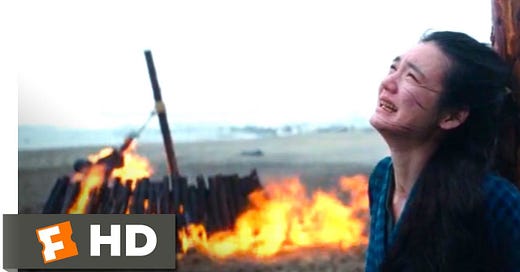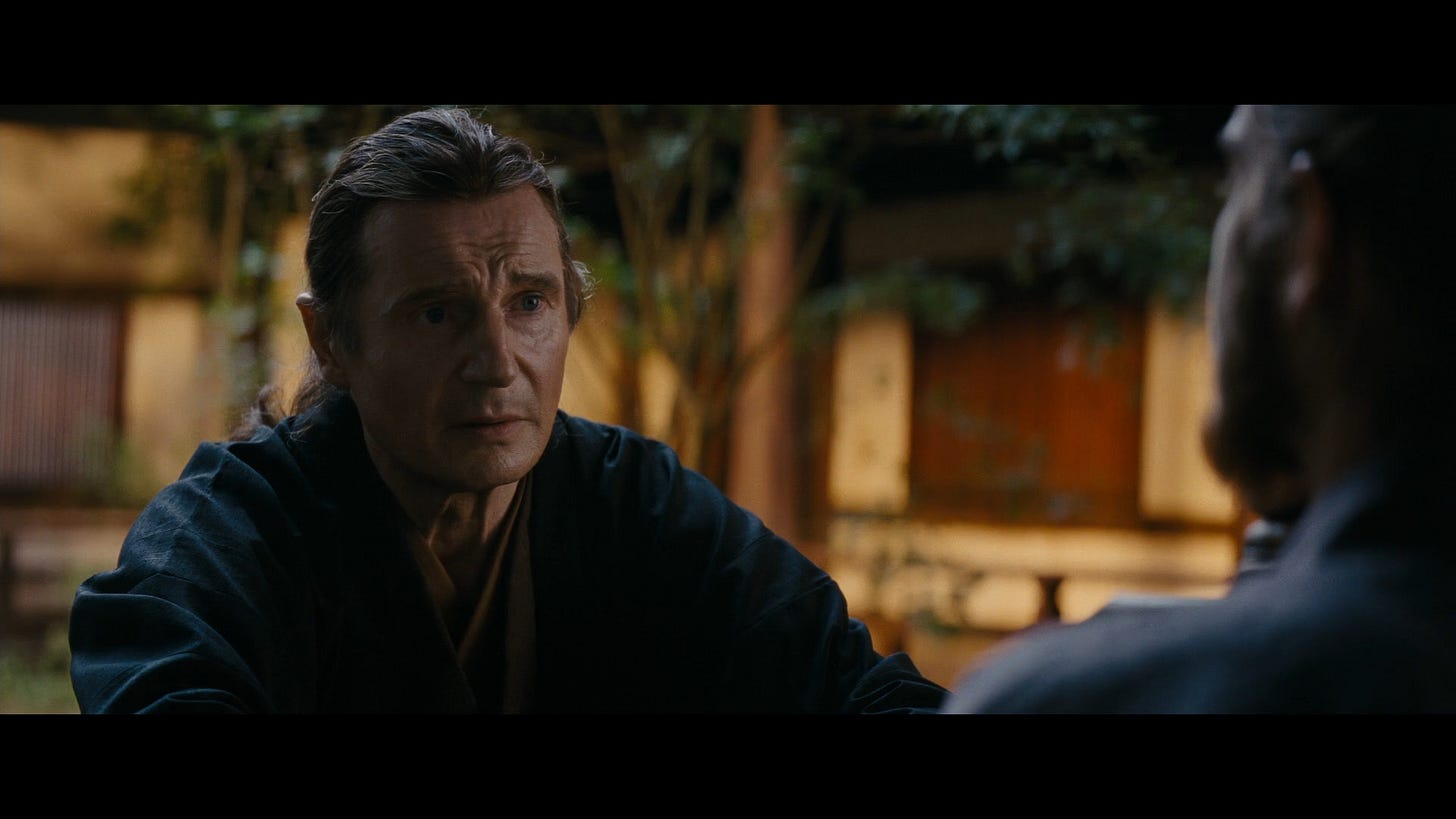Film/Book Review: Silence [Part 2] - Where is the Place for a Weak Man, in a World Like This?
The Priest, and The Wretch
(Part 1 linked here: Film/Book Review: Silence [Part 1] - Torture & Doubt )
‘Silence’ (2016) Review: [Part 2] - Where is the Place for a Weak Man, in a World Like This?
[Plot… continued]
When we left our missionary Priests they were flailing about in Japan. After finding villages of ‘Kakure Kirishtians’ (hidden Christians) their presence alerted the authorities to some possible crimes of belief, and the most faithful and prominent several Christian men of Tomogi had been lashed to crosses and left to die, through drowning or exposure.
The priests are very close to one another, full of filial commitment. Guerpe (called Garupe-Driver) is the stricter and more easily frustrated of the two. Rodrigues (Garfield) is more tender and patient with the rustic Japanese. Both of them regard Kijichiro with exasperation and some disdain. Despite their Jesuit bond, the fathers decide to split up… and the story moves closer to its dark inevitability.
Kojichiro - A Weak Man
And He said to them, "Go ye into the whole world,” and preach the gospel to every living creature, "even to one such as this." -Fr. Rodrigues
Kijichiro was alone out of the Tomogi hostages to fully tarnish the Christian icons placed before him (a test for determining Christian vs. pagan loyalty devised by the authorities). He is immediately released, his behavior standing in contrast to the physical courage of the other three men.
We understand Kijichiro better by this point, though. While travelling between the villages, Rodrigues tells us in his voice over that he “sensed the greatest need from Kijichiro,” who was often absent from services and tended to hang at the edges of the throngs of the faithful in the villages. As they sit in the hills above the village, alone, Kijichiro recounts his story, faithfully:
“The Inquisitor, Inoue, wanted us to give up our faith…. stamp on Jesus with our foot. Just once, just fast. But [my family] would not. But I did. But I could not abandon them, even if I had abandoned God. So I watched them die.
We see his relatives bound into reed mats and carried to a seaside pile of lumber, and dumped roughly atop one another as a torch is put to the kindling at the base. His sister is bound to a stake, as is his brother, and the flames begin to envelop them all as Kijichiro watches, silently. Scorsese uses a kind of fast receding cinematic view, as if the viewer is soaring away from the grisly beach, looking backward. Subconsciously it summons the feeling of a soul flying away from the grounded material reality… but it doesn’t lessen the tragedy and horror of the scene.
Kijichiro’s family was burned alive for not renouncing their faith… he could abandon his eligion but he could not abandon them and he watched as they died.
Wherever I go, I see the fire and smell the flesh. When I saw you and Padre Garupe, for the first time, I started to believe… that God might take me back. Because in my dreams the fire was no longer so bright.
Father Rodrigues gains tremendous empathy for Kijichiro after this confession, which is slightly diminished after Kijichiro escapes death in Tomogi. Again and again we see Kijichiro seized by his fear (and, later, his greed), making the wrong decision. He is a contemptible figure. As Rodrigues leaves Tomogi (separately from Guerpe) he encounters Kijichiro on the path, full of shame at his repeated failures of courage:
Mokichi and my family stayed strong… I am so weak.
Where is the place for a weak man, in a world like this?
Rodrigues understands that the forgiveness offered by Christianity is boundless and unconditional but is still unimpressed by Kijichiro’s character.
Soon after these scenes, Rodrigues becomes separated from Kijichiro and is captured by the local samurai. Kijichiro has betrayed the padre to the local government in order to collect the reward. We see the samurai throw handfuls of coins in Kijichiro’s direction (an obvious parallel to the Gospel story of Judas’ betrayal for 30 pieces of silver) but even after this Kijichiro follows along, desperate for absolution.
Rodrigues is taken to a castle/prison in Nagasaki and kept well-fed and clothed by the authorities. He is permitted to leave (under guard) on two occasions: once to witness (from a distance) Guerpe struggling to save Japanese Christians who have been bound and thrown into the ocean. Guerpe, despite his earlier irritability with the Japanese, struggles so desperately to hold their heads above water that he drowns, while Rodrigues futilely struggles against a dozen samurai, restraining him out of earshot of Guerpe.
The second time he leaves he is taken to a villa and meets the focus of his missions: Father Ferriera. More on that fascinating encounter in Part 3. Rodrigues is confused at the decent-even friendly-treatment he receives from the Japanese. He has not comprehended their true aim: they are determined to torture not his body, but his soul.
In Part 3 of this review Rodrigues finally meets Ferreira… and his greatest test of faith.
Reflection #3 -
Kijichiro cuts a pathetic figure in the story but if we apply a modicum of empathy we must see ourselves in him. Who among us would have the courage to be burned alive when a quick symbolic iconoclasm would free us? Who would maintain their character and sobriety after seeing the horrible death of their entire family?
“Christ did not die for the good and beautiful; that is easy enough. The hard thing is to die for the miserable and corrupt.” -Fr. Rodrigues
We are gently led to a feeling of affection and admiration for the Tomogi martyrs-and by extension all martyrs-but the Gospel is consistent in its message: Christ did not die for the brave or the resolute. The message of the Old Testament is that Christ’s ministry and his mission was on behalf of all people.
Who do you despise? Pedophiles? Terrorists? Addicts? Psychopaths? Prostitutes? Narcissists? So do I. So did the apostles, and it seems that they never fully grasped the allegorical message of Christ’s repeated encounters with Samaritans and adulterers and the possessed and thieves: if you take Christianity seriously you must constantly and fervently regard such people as your brothers and sisters… and your spiritual equals before God. This (like the message to love your enemy and pray for them) stands in constant contradiction with human nature. Nevertheless, it is the fundamental brilliance of the Christian faith. Those commandments of love and humility make Christianity the most outstanding moral philosophy ever developed in the context of a major religion, although they have (predictably) rarely been displayed consistently by Christians themselves. It seems that we, as a species, are driven to erect hierarchies and then to equate status and respect and competence and likeability with goodness. Christianity teaches, essentially, that there are no good people and it is implied that many of the most well respected and wealthiest and most religiously celebrated are actually some of the worst individuals in our society. This is a message which should always be remembered and taken seriously, in my opinion,
We despise Kijichiro only at our own spiritual hazard, for Kijichiro is you, and me.
[Part 3] - Apostasy & Faith
…coming soon.






